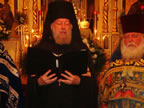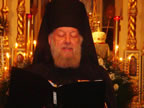
NEW YORK: December 23, 2008
Speech of Archimandrite Jerome (Shaw) At the Nomination Service On the Eve of His Consecration as Bishop of Manhattan
From the Editors: The following is the speech read by Archimandrite Jerome (Shaw) during his nomination as Bishop of Manhattan. His consecration was held on December 10, 2008, on the feast day of the Kursk-Root Icon of the Mother of God at the Synodal Cathedral of Our Lady of the Sign in New York.
 Your Eminences, divinely wise Hierarchs, dear Vladyki, Your Eminences, divinely wise Hierarchs, dear Vladyki,
The Apostle Paul writes, If anyone desires to be a bishop, he desires a good work (I Timothy 3:1).
But in our time, for the most part, candidates are elected who did not desire to become hierarchs, or who had not even thought of it.
Such unwillingness can be explained by the difficulties and responsibility of this service.
But when someone does seek to become a bishop, his desire can lead him into schism, or in some other way cause harm instead of benefit to the Church.
One might compare the bishop's service to a high road, from which a person can fall, on the one side into spiritual pride and haughtiness, or on the other, into timidity and lack of firmness, thus subjecting the flock to the caprice and abuse of those who seek power.
The bishop must neither place his hope in his own abilities, nor think himself alone.
We should also remember these other words of the Apostle: For Christ did not please Himself... But may God, of patience and consolation, grant you to be one in wisdom, in Christ Jesus: so that in one spirit, with one mouth, ye may glorify God (Romans 15:3,5), and also: Christ is our peace, having made the two one (Ephesians 2:14).
The Church of Christ unites fallen mankind with the Lord God, while the bishop is a server of that holy union and unity.
How to I envision serving as a bishop?
Our Lord and God, Jesus Christ, more than 2,000 years ago, established His One, Holy, Catholic and Apostolic Church on earth: I will establish My Church, and the gates of hell shall not prevail against it (Matthew 16:18), and He provided His Apostles to preserve the unity of the faithful.
So long as Christ was on earth, there could be no schism or heresy, since everyone could see who was with Christ, and who was against Him.
But, once the Lord had ascended to heaven, disagreement, division and false teachings became possible among Christians.
St Ignatius of Antioch writes that the bishop, as an image of Christ, should be a center of unity in the Church.
Many schisms and divisions have rent the robe of the Church, but through the tradition of the Apostles and Holy Fathers, we have the mystic understanding of the Church as the Body of Christ. In the Eucharistic unity of all the Orthodox, the truth of Christ, the salvation of humanity from sin, is preached to the world.
Keeping the unity of the Church means, first of all, that we remain in the mystical Body of Christ. We are nourished by the One Chalice of the Body and Blood of the Lord, and the Body of Christ always enjoys full communion among all its members.
Since the Body of Christ is One on earth and in heaven, the fullness, or entirety, of the Church is always present in it. Thus the unity of the Church includes the one teaching, committed by Christ to the holy Apostles in its entirety, without changes or additions; the unity of the faith and the communion of the Holy Spirit.
 The Church always abides in its fullness; all Orthodox Christians throughout the world and throughout time, are together with us, when we communicate and when we are at prayer in the Church: all the Saints, all our ancestors, all those close to us, regardless of where they are: in this life, or in heavenly abodes. The Church always abides in its fullness; all Orthodox Christians throughout the world and throughout time, are together with us, when we communicate and when we are at prayer in the Church: all the Saints, all our ancestors, all those close to us, regardless of where they are: in this life, or in heavenly abodes.
In this fullness, there abides not only the Church of Russia, but all the Local Orthodox Churches of all lands and all Orthodox peoples.
For this reason, there are no closed or destroyed churches, no abolished monasteries, because the Lord God, in whom their departed members abide as part of His Church, is outside of time, and they are eternally with Him.
One should therefore not suppose that any part of the Church has ceased to exist. For example, the Armenian Church of St. Gregory the Enlightener will always exist in heaven, no matter what the state of the Armenian Church on earth may be.
The earthly Roman Church separated from Orthodoxy; but the heavenly, Orthodox Church of Rome will always exist, and St Gregory the Dialogist and the other Orthodox Western Saints are ever with us.
The earthly Armenian Church, and the Roman, fell away from the unity of Orthodoxy, and are deprived of communion with us: but the Armenian and Roman Saints, being in the Kingdom of God in heaven, eternally present that spiritual foundation upon which those Churches can be restored.
This truth was seen with exceptional spiritual clarity by St John Maximovitch, who restored Western Orthodoxy: he remains invisibly present with us, and his mission lives.
In other words, to be Orthodox means to be in union with the whole Orthodox Church, and to accept all of its heritage.
Walling oneself off from heresy is impossible; but we must, at all costs, remain within the borders of the Holy Church.
Therefore, the bishop is not left to his own powers, but is one of the organs of the Body of Christ.
Since I have now been elected to serve as a hierarch, I see the main goal of that service as working to strengthen church unity.
Thoughts of church unity led me to the True Church when I was still in my teens.
My parents and ancestors were of Anglo origin, and I had been raised in the Anglican (Episcopal) Church. But one has only to ask where Anglicanism had its origin, when Protestantism began, to see that the Church of England had broken away from Rome, and Rome in turn from the Orthodox Church, and only the Orthodox Church remains in spiritual unity with the Church of Christ and the Apostles.
From the time I was received into the Orthodox Church, I was blest with such teachers as our ever-memorable hierarchs, Archbishops Nikon, Averky and Seraphim, and among those still on earth Bishop Daniel of Erie and Archbishop Alypy; as well as our new Saint John Maximovitch. They had a great influence on me, and I have a sense of filial love towards them.
Other major influences were Fathers Kiprian (Pyjoff) and Vladimir (Sukhobok) of Jordanville, Fr. Theophan (Shishmanoff), Fr.-Protodeacon Victor Lochmatow who recommended not only my position with Archbishop Nikon, but also my appointment to the parish in Milwaukee, where I served almost 18 years. Feodor Konstantinovitch Rimsky, the father of one of my boyhood schoolmates, long ago had recommended the Russian Orthodox Church Outside Russia to me; and there have been many others, too many to name all those to whom I owe a debt of gratitude.
In the One Holy Church, we, the living, are always united with our departed teachers, relatives, with the Holy Apostles and Angels.
And since in the True Church, all Her members have communion among themselves, when at age 17 I came back to the Orthodox Church, I felt that I was returning to the Church of my own, English, Irish and Scottish ancestors: since they, before the separation of the Western Church, had been members of the same Orthodox Church.
In the unity of the Church, all of those who in our childhood and youth had shown us the true path, who were our teachers, are always present with us.
And we must all pray for one another, that our earthly strivings might bring rich and holy fruit on the meadow of Christ's holy Orthodox Church, to the glory of our Lord Jesus Christ, and of the Holy Russia which exists forever in heaven and in which we spiritually live, lest we fall from the narrow path that leads on high.
Therefore I ask our hierarchs, enlightened by God, and the whole sacred and honorable Council, and those gathered here with us, to pray for me a sinner, that, not falling into discouragement at the troubles and disappointments in church life, might honorably and worthily carry out the service of a bishop in our Russian Orthodox Church. Amen.

|